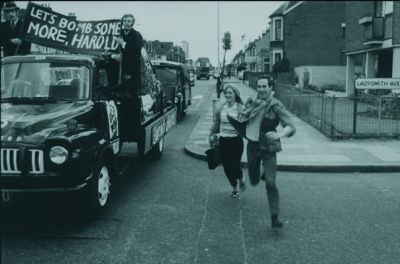
TELL ME LIES
(Gb/1968) R.: Peter Brook. D.: 108'. V. inglese. Digitale
Sog.: dall'opera teatrale di Denis Cannan. Scen.: Peter Brook, Michael Kustow, Michaels Scott. F.: Ian Wilson. M.: Ralph Sheldon. Mus.: Richard Peaslee. Su.: Robert Allen. Int.: Mark Jones, Pauline Munro, Eric Allan, Glenda Jackson, Peggy Ashcroft, Paul Scofield, Kingsley Amis, Stokely Carmichael. Prod.: Peter Brook per Brook Productions, Peter Sykes, Ronorus. Pri. pro.: 17 febbraio 1968. DCP. D.: 108'. Col e Bn. Versione inglese con sottotitoli italiani / English version with Italian subtitles
Da: Technicolor Foundation for Cinema Heritage
Restaurato nel 2012 da / Restored in 2012 by Groupama Gan Foundation for Cinema and Technicolor Foundation for Cinema Heritage
Tell Me Lies è un mélange di stili della Royal Shakespeare Company che espone tutti i possibili argomenti contro la guerra del Vietnam (compreso il fatto che stiamo trasformando i ragazzi di Omaha in omosessuali). Il metodo è esplicitamente brechtiano: ci sono canzoni, sketch, interviste, filmati documentari. Uscito l'anno scorso al culmine delle proteste anti-Vietnam (dopo il Pentagono, prima dello stop ai bombardamenti e durante le primarie di McCarthy nel New Hampshire e nel Wisconsin), Tell Me Lies è stato stroncato dalla critica newyorkese. Stanley Kauffman di "New Republic" ha riassunto il caso dicendo che "era il film sbagliato al momento giusto". Il giudizio unanime era che Tell Me Lies fosse politica da quattro soldi, un'interpretazione in bianco e nero che puntava a vincere facile. Ignorando le complessità che portano una nazione 'illuminata' e 'democratica' a massacrare innocenti, Tell Me Lies finiva per denigrare tanto i falchi quanto le colombe (di lì a poco Green Berets avrebbe fatto lo stesso, dal punto di vista conservatore). Un anno dopo, l'effetto di Tell Me Lies appare mitigato. Il film non si proponeva tanto di condannare a tutti i costi l'Occidente quanto di descrivere l'angoscia della situazione. Dato però che rappresentava tutte le sfumature della posizione anti-Vietnam, dalla realpolitik alle motivazioni morali, era destinato a scatenare attivisti di ogni provenienza. Non era il film a essere a senso unico, ma il suo pubblico: ecco il perché di questa ingiusta accoglienza. [...] Il film ha molti buoni momenti: la ricostruzione delle ultime quarantotto ore di vita di Norman Morrison, il giovane quacchero che si è dato fuoco davanti al Pentagono; le parole di Stokely Carmichael sulla guerra e il razzismo; una rassegna di 1001 Ways to Beat the Draft, pamphlet satirico contro la leva obbligatoria ("Scorreggia l'inno nazionale", "Tira fuori l'uccello e chiedi se entrerà nelle ragazze del Paese in cui finirai"). E naturalmente le canzoni: Zappin' the Cong, We Maim by Night, We Heal by Day e The Ballad of Barney Banshol (il ragazzo del Minnesota che ha gettato escrementi in un ufficio di reclutamento).
Paul Schrader, Films and Vietnam, "Los Angeles Free Press", 14 febbraio 1969
Tell Me Lies is a melange of styles by the Royal Shakespeare Company which raises every imaginable argument against the Vietnam War (including the fact that we are transforming Omaha boys into homosexuals). The method is overtly Brechtian: there are songs, skits, interviews, and documentary footage. When released last year at the height of the anti-Vietnam protest (after the Pentagon, before the bombing halt, and during McCarthy's New Hamshire and Wisconsin primaries), Tell Me Lies was righteously panned by the New York Critics, Stanley Kauffman of the "New Republic" summed up the case saying that "it was the wrong film at the right time". The consensus was that Tell Me Lies was cheap politics, a black-white interpretation of the conflict which went for easy victories. By ignoring the complexities which cause an "enlightened", "democratic" nation to slaughter the innocents, Tell Me Lies ultimately denigrated the doves as well as the hawks (As Green Berets was to do for conservatives later that year. Seen in the retrospect of one year, Tell Me Lies has a much milder effect. The film's purpose is not so much to damn the West at any cost, but to present the anguish of the situation. But because Tell Me Lies represented all sides of the anti-Vietnam position - from realpolitik to the moral argument, it was bound to infuriate anti-war crusaders of every stripe. Tell Me Lies was not polarized; the audience was, and thus it received an unfair reception. [...] There are many very good bits in Tell Me Lies: the reinactment of the last 48 hours of the life of Norman Morrison, a young Quaker who set himself a fire on the steps of the Pentagon; some straight talking on the war and racism by Stokely Carmichael; and a roll-call revue of 1001 Ways to Beat the Draft ("Fart the National Anthem", "Pull out your dick and ask them if it will fit into the girls of the country you're going to"), And of course the songs: Zappin' the Cong, We Maim by Night, We Heal by Day and The Ballad of Barney Banshol (the Minnesota farm-boy who threw excrement in the Draft Board files).
Paul Schrader, Films and Vietnam, "Los Angeles Free Press", February 14, 1969

Tariffe:

Numero posti: 174
Aria Condizionata
Accesso e servizi per disabili
Il nostro cinema aderisce al circuito CinemAmico: è possibile utilizzare l’applicazione MovieReading® per i film di cui è prevista audiodescrizione e/o sottotitolazione sull'applicazione.
Tel. 051 2195311











